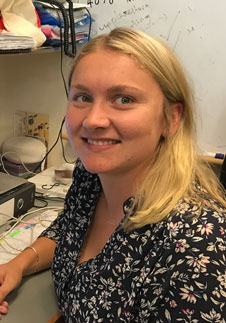 Monday 6 March 2017 12:37pm
Monday 6 March 2017 12:37pm
Kirsten Ward-Hartstonge
A pilot study by University of Otago researchers suggests that people with colorectal cancer that have a certain type of immune cell in their tumour may have increased survival rates.
The Department of Microbiology and Immunology researchers found that people with more "effector T regulatory (Treg)" immune cells present in their colorectal tumours were more likely to be disease-free for longer than those who had fewer of these cells.
The study involved 32 individuals with early stage (II) colorectal cancer. These patients were followed up for more than five years and 13 individuals had recurrence of their cancer over this time and 19 individuals did not. The findings appear in the international journal Cancer Immunology, Immunotherapy.
Using a new tool to measure basic immune cell infiltrates in tumours, the Immunoscore, and measuring more complex immune cells, the research looked at which type of immune responses were associated with patient survival.
The researchers found that although the Immunoscore was better than the current staging at estimating patient survival, adding “effector Treg” immune cells made it even better.
Study co-author and PhD student Kirsten Ward-Hartstonge says the study findings mean that it could be possible to measure immune responses in colorectal cancer patients to estimate which patients are likely to get their cancer back and should therefore be given additional treatment.
“This information could be used to tailor existing therapies to be targeted to people who really need them, rather than taking a more blanket approach,” Miss Ward-Hartstonge says.
Around a quarter of patients who are currently considered “low risk” by current staging methods will eventually develop the disease again, she says.
These patients usually do not receive chemotherapy or radiotherapy because the risks and costs were thought to outweigh the benefits.
“By measuring an individual patient's Immunoscore and 'effector Treg' immune cells, it may be possible to more accurately identify patients at high risk of getting their disease back and treating them more effectively,” she says.
Other research has shown that New Zealand and Australia have the highest rates of colorectal cancer incidence and death in the world.
The research is collaboration between the Departments of Microbiology and Immunology, and Surgical Sciences at the University of Otago. It was funded by the Genesis Oncology Trust and Lottery Health Research.
For more information, contact:
Kirsten Ward-Hartstonge
Department of Microbiology and Immunology
University of Otago
Tel 03 479 5876
Email: warki140@student.otago.ac.nz
A list of Otago experts available for media comment is available elsewhere on this website.
Electronic addresses (including email accounts, instant messaging services, or telephone accounts) published on this page are for the sole purpose of contact with the individuals concerned, in their capacity as officers, employees or students of the University of Otago, or their respective organisation. Publication of any such electronic address is not to be taken as consent to receive unsolicited commercial electronic messages by the address holder.
